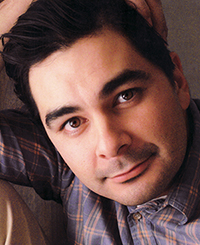PCPA (since 1999): Baker, Into the Woods; Touchstone, As You Like It; Titinius, Julius Caesar; Scuttle, The Little Mermaid; Gomez, The Addams Family; Monty Navarro, A Gentleman’s Guide to Love and Murder; Mr. Darling/Captain Hook, Peter Pan; Kit Marlowe, Shakespeare in Love; Mike, Freaky Friday; Reverend John Hale, The Crucible; Clopin, The Hunchback of Notre Dame; Bernard Nightingale, Arcadia; Sir Andrew Aguecheek, Twelfth Night; Tito Merelli, Lend Me A Tenor The Musical; Gaston, Beauty and The Beast; Ed, You Can’t Take It With You; Usnavi, In The Heights; Pinocchio, Shrek the Musical; Ensemble, Cinderella; The Pirate King, The Pirates of Penzance; Duke of Buckingham, Richard III; Jamie, My Fair Lady; Pedro, Man of La Mancha; Buster, Christmas Is Here Again; Slank/Hawking Clam, Peter and the Starcatcher; John Bell, 36 Views; Curly, Oklahoma!; Gary, Noises Off; Bert, Mary Poppins; Laertes, Hamlet; Perchik, Fiddler on the Roof; Sir Galahad et al., Spamalot; Valvert/The Musician/u/s Cyrano, Cyrano de Bergerac; Caliban, The Tempest; Corny Collins, Hairspray; Ensemble/u/s Shadow, My Fairytale; Ronnie Driscoll, Curtains; Bernardo, West Side Story; Yonkers, Gypsy; Ensemble, Scrooge; Ensemble, 42nd Street
Other Theatres: Actor: The Great American Melodrama, Utah Shakespearean Festival, California Cabaret Theater: Director, I Love You…You’re Perfect…Now Change!, Every Christmas Story Ever Told, The Nerd
Teaches: Acting 1
Training: PCPA (class of 2001)
Teaching Philosophy
Teaching the actors process almost seems magical and practically impossible. I tend to view the actors process as a practical concept that only becomes honed through time. The magic does happen when we let ourselves become open and available to real and true human connection. And to become truly available to true human connection we must shed all the affections put upon us in our teens if we truly want to become good actors as adults. In a way, training for acting is like making the bridge between our adult selves and our child selves, back to the time when we were the best at believing and pretending. And play is the key that unlocks the gate to this bridge.
The environment of the classroom is crucial. It must be a safe and playful place, free of negative judgement and open to offers and suggestions. There is an agreement that we all participate and we all keep the space safe. Creativity has no space for negativity, which is the cause of closed mindedness and stunts the imagination. We agree, we trust, then and only then can we create. Play.
I see the personal process of acting much like the art of archery: we can tell a student how to knock an arrow, find finger placement on the string, to draw, to find the anchor point, aim, and properly release. We can only teach each part of the process by how we, the teachers, understand it. But the student must understand it for themselves to actually complete the arrows journey. And each student has their own way or language of how they understand the world, and I must learn to speak their individual language of the world in order to teach the parts and the steps to get them there.
My job is to nurture all the parts and nurture all the steps through the journey. The imagination, the understanding of the human condition and behavior, to stay open of heart and mind, to encourage the thirst for history, to live for a love of life, ignite ethics of a workaholic, instill their forward moving drive and positive eye. I am there to identify the bad habits and to encourage good ones. And to teach them to fall in love with their art. I feel we must fall in love with everything we do as actors. No matter what play, project, song or opera, we must find a way to fall in love with the work. Love for the work is not only important but it is key if an artist wants to stay an artist.
